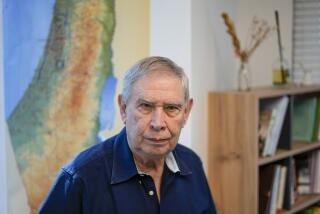Kadafi Yet to Make Good on Threat to Reform Libya’s Military
- Share via
TRIPOLI, Libya — As Libya’s top military brass nervously fingered their uniforms nearby, the country’s leader, Col. Moammar Kadafi, declared at a ceremony earlier this year, “No people has ever protected its independence by using the conventional, classical military led by medal-clad generals.”
Ever since Kadafi came to power in a 1969 coup, the military has played a significant role in Libyan affairs. But as the speech to a group of military cadets suggested, Kadafi has laid plans to restructure the Libyan armed forces in the same way that he has revolutionized life in Libya.
Kadafi announced in that Sept. 1 speech that the regular Libyan army, estimated by Western analysts to number about 60,000, would soon be abolished and replaced by so-called Jamhiri Guards, a small professional army that would also include the police.
He said a People’s Army, based on conscription, would be formed, making way for “younger people and for batches (of recruits) with fewer problems.”
These two groups would be supplemented, Kadafi said, by giving arms to ordinary people, who would form defensive units in their regions under the command of people’s committees.
“As from today,” Kadafi said, “we will rely upon the armed people to protect our soil and our freedom and to confront our enemies and defeat them in the way and through the means that I have now explained to you.”
Although more than three months have elapsed since Kadafi announced these changes, there have been no signs in the capital of any significant restructuring taking place--although there was one order recently that made colonel the highest rank in the military.
One high-ranking officer told a Western diplomat that he would be surprised if anything ever happens.
But Kadafi has strong incentive to reform the army before significant trouble arises in what a Western envoy termed “the only force in Libya with the power to overthrow the leader.”
Morale in the country has been particularly low since a spectacular defeat of the Libyan military in Chad in March, 1987. According to Western diplomats, the Libyans were literally decimated; they lost 6,000 either killed or wounded, or 1 in 10 of their total force.
In a nation of only 3 million people, such casualties for a single month were staggering. Virtually every family felt the loss as bodies were shipped home for burial. The fact that Chad’s army is only lightly armed and is poorly trained underscored the humiliation of the defeat.
“People weren’t saying the Libyan army was defeated in Chad,” said one diplomat. “They were saying Kadafi’s army was defeated. It didn’t look good at all.”
In April, 1986, the army had suffered a major humiliation when American warplanes bombed Tripoli and Benghazi almost unimpeded. The embarrassment was made even worse by the huge amounts that Kadafi had spent on sophisticated arms, such as anti-aircraft weapons from the Soviet Union.
Economics is frequently cited as being behind Kadafi’s decision to pare down the size of the regular army. Current military expenditures total more than $800 million a year, an amount that represents 16% of the country’s revenue from the sale of oil.
Stripped of the rhetoric, the idea of a small professional army backed by a larger force made up of conscripts is hardly revolutionary. Many analysts here believe that Kadafi merely felt the urge to make the military professional again after it suffered some catastrophic defeats.
In the past, for example, conscription was not a revolving door, constantly providing fresh recruits. Once drafted, recruits found it almost impossible to leave the army. Many conscripts who fought in Chad had served between eight and 10 years.
Diplomats said recently that there has been evidence of a general demobilization in Libya, as well as a conscription drive to fill the void left by the shrinkage of the army.
The military has been a recurring problem for Kadafi. In November, 1985, morale in the professional officer corps was said to have plummeted when Col. Hassan Ishkal, head of the Surt military region, was killed in a gun battle at Kadafi’s headquarters in Tripoli.
Ishkal was said to have gone to see Kadafi to oppose a reduction of the benefits enjoyed by the regular army.
In any case, Kadafi appears to have placed his plans to reduce the benefits on hold after the killing.
Kadafi has also imposed sharp limits on the role of so-called revolutionary committees within the military. The committees served as secret watchdogs at military installations after a coup attempt against Kadafi in 1984. But their excesses were so great that, earlier this year, he sharply curtailed their influence and ordered a number of their leaders to be executed.
“When I call for the establishment of the armed people at the expense of the conventional military institution, the shallow and ignorant person supposes that this call reflects weakness,” Kadafi noted recently.
“But in saying this, I am calling for strength; I am calling for the defense of freedom, peace, the homeland and pan-Arabism; I am calling for the formation of an instrument which cannot be defeated.”
More to Read
Sign up for Essential California
The most important California stories and recommendations in your inbox every morning.
You may occasionally receive promotional content from the Los Angeles Times.










